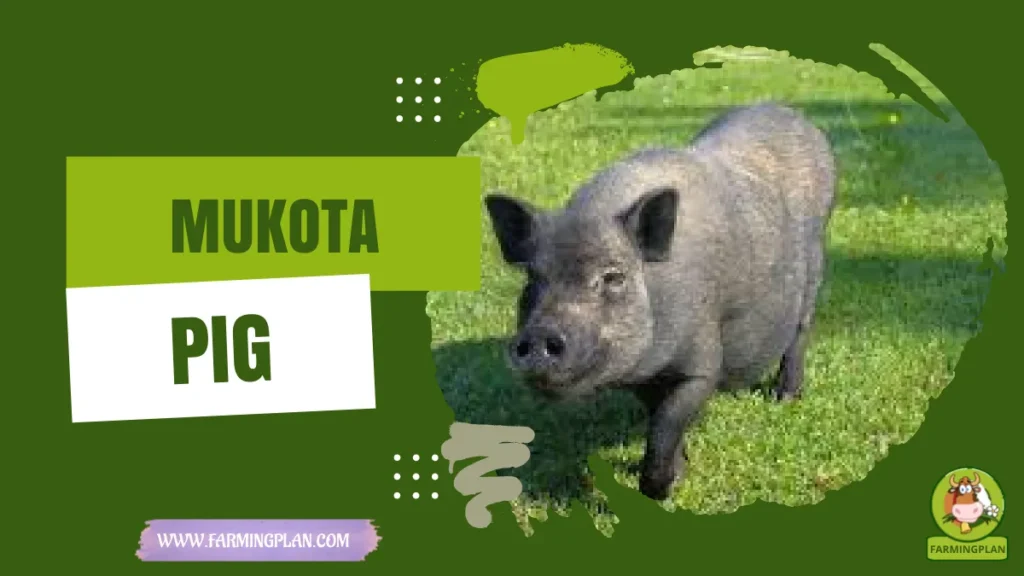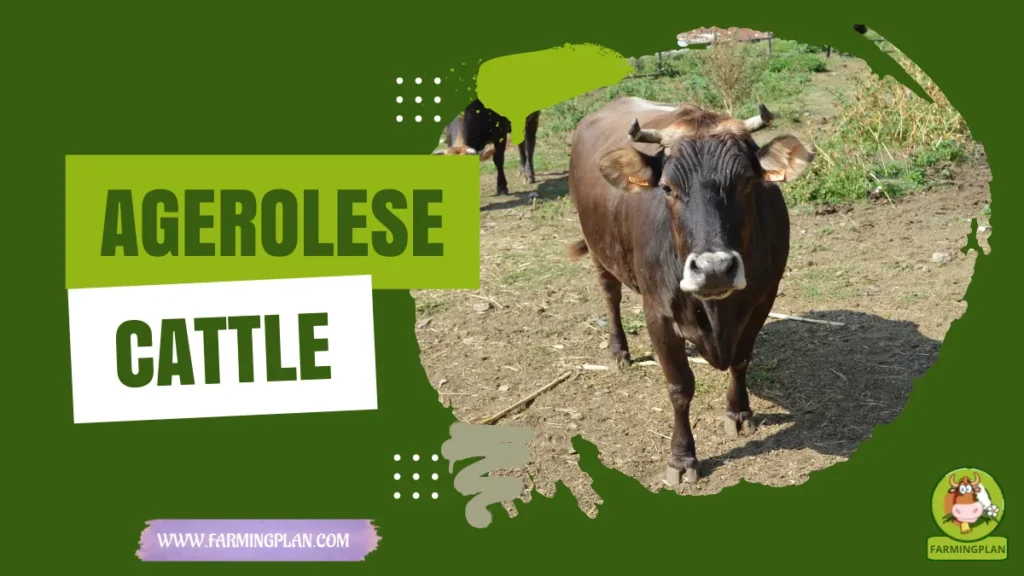The American Fuzzy Lop Rabbit is an adorable, compact breed known for its soft, wooly coat and playful, gentle nature. Loved by pet owners everywhere, this friendly bunny stands out with its distinctive markings and soft rollback fur. Often confused with other lop breeds, the American Fuzzy Lop has a unique charm that makes it a popular choice for families and rabbit lovers. Whether you’re thinking about bringing one home or simply want to learn more, this guide covers everything—from the breed’s origins to essential care tips. If you want a lovable, energetic pet with a sweet personality, the American Fuzzy Lop might be the perfect addition to your family.

History & Origin
The story of the American Fuzzy Lop Rabbit begins with a desire to blend charm with texture. In the early 1980s, breeders in the United States set out to develop a rabbit that had the compact size and lopped ears of the Holland Lop but with the long, soft wool of Angora rabbits. This goal sparked a creative journey that would lead to a whole new breed.
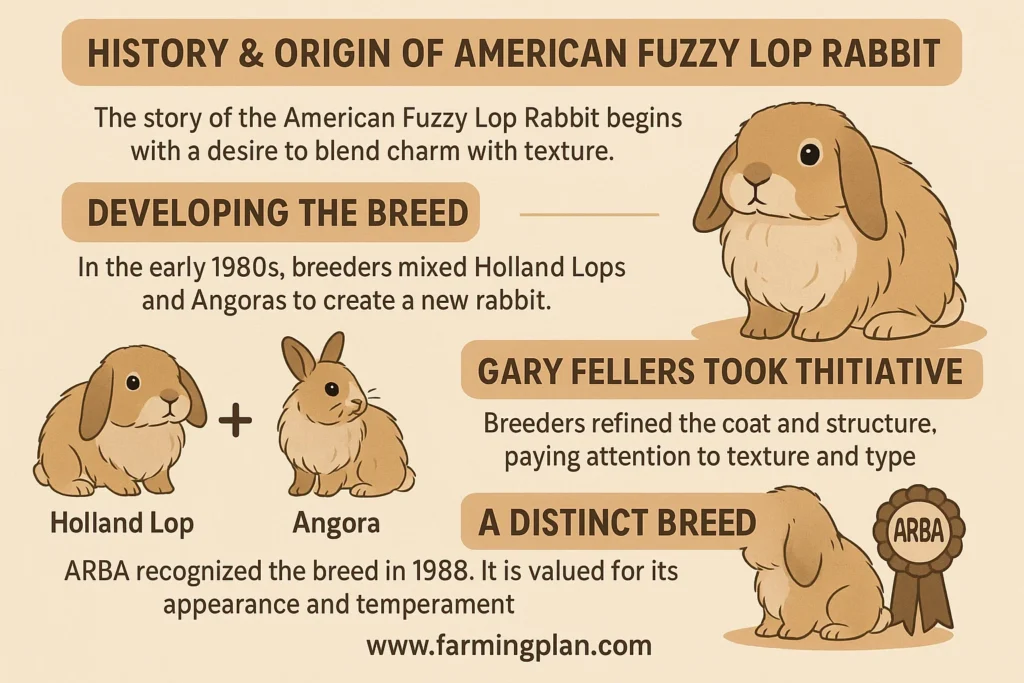
One of the key players in this effort was Gary Fellers, who started by crossing Holland Lops with French Angoras. This mix introduced the wool gene into the lop line. Breeders like Kim Landry and Margaret Miller carried the work forward by refining the coat and structure through careful selection. They paid close attention to coat texture, head shape, and body type.
The result was a rabbit with a wooly, dense coat and a playful, friendly personality. In 1988, the American Rabbit Breeders Association (ARBA) officially recognized the American Fuzzy Lop Rabbit as a distinct breed. From there, it quickly gained popularity among rabbit enthusiasts for its appearance and temperament. Today, the American Fuzzy Lop rabbit is not just a show animal. It’s a beloved pet and a staple in the world of Fuzzy Lops. The breed continues to thrive, thanks to a dedicated gene pool and the commitment of breeders who value both health and personality.
Read More: Polish Rabbit: Breed of Domestic Rabbit
Characteristics
The American Fuzzy Lop Rabbit is a compact, wool-coated rabbit with a distinct appearance that makes it easy to recognize. Its head is broad and flat, with a short muzzle and large, lopped ears that hang close to the cheeks. This breed has a short, thick neck and a strong, muscular body that gives it a sturdy look despite its small size.
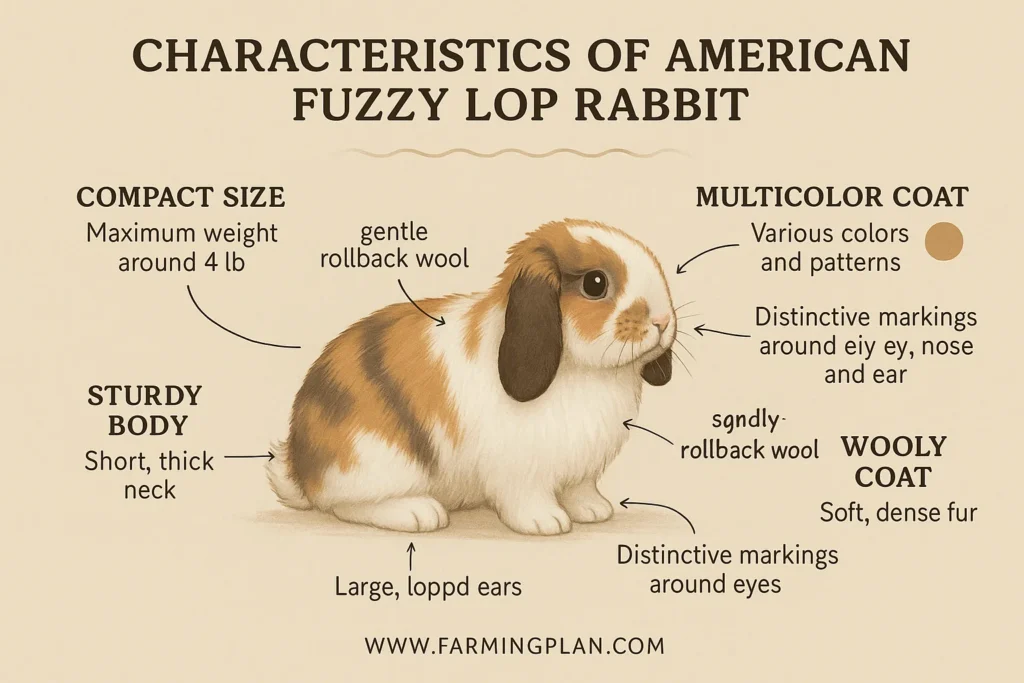
One of the most striking features is the wooly coat, which comes from the Angora gene introduced during the breed’s development. The fur has a gentle rollback coat, meaning it slowly returns to position when stroked backward. This texture makes it both soft to the touch and beautiful to look at. American Fuzzy Lops come in a wide range of colors and patterns. Many have multicolor coats, and the broken pattern (patches of color on a white body) is especially popular in shows. These bunnies often have distinctive markings around the eyes, nose, and ears that add to their unique charm.
The maximum weight for a fully grown adult is usually around 4 pounds, making them one of the smaller lop breeds. Their compact size and fluffy appearance make them a favorite among people looking for a pet rabbit with personality and visual appeal. This adorable animal stands out not only for its looks but also for its high-quality, impeccable coat that requires regular care to maintain its beauty.
Read More: American Sable Rabbit: Perfect Pet With A Gentle Heart
Nature & Temperament
The American Fuzzy Lop Rabbit isn’t just cute—it’s also one of the most affectionate and playful breeds you can bring home. Known as a highly friendly rabbit, this breed thrives on human interaction and loves spending one-on-one time with its favorite people. Whether you’re an experienced rabbit owner or a first-time bunny parent, the American Fuzzy Lop Rabbit makes a great companion. These rabbits are very energetic and curious by nature. They enjoy exploring their surroundings, playing with toys, and hopping around freely in safe, enclosed areas. Their playful side makes them especially popular among families with children. Just be sure to teach kids how to handle these prey animals gently and respectfully.
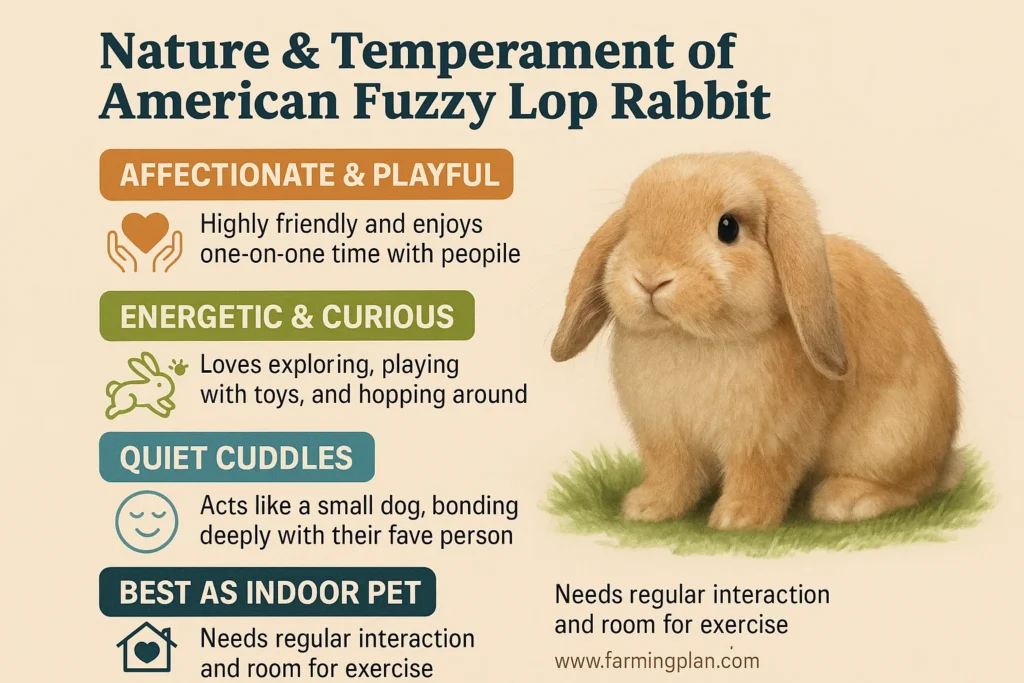
Despite their lively personality, American Fuzzy Lops also enjoy quiet cuddles. Many owners say their bunny acts more like a small dog, following them around the house and bonding deeply with their fave person. These indoor rabbits feel most comfortable in a familiar environment with limited cage space for downtime and plenty of open space for exercise. They do best in homes where they receive regular attention, positive reinforcement, and safe socialization. These bunnies are happiest when they’re part of a daily routine, sharing little interactions with their human families.
Read More: Checkered Giant Rabbit: A Gentle Giant Breed
Food & Diet
Feeding your American Fuzzy Lop Rabbit the right diet is key to keeping it healthy, happy, and full of energy. These adorable animals need a balanced mix of hay, pellets, fresh vegetables, and fresh water every single day. Hay should make up the bulk of their diet—timothy hay is best for adults.
It supports good digestion and helps prevent dental problems by naturally wearing down their teeth. Offer fresh hay at all times, making sure it stays clean and dry. High-quality pellets are also important. Choose a plain rabbit pellet (no colorful bits or seeds) made specifically for small breeds. Feed the correct portion based on your bunny’s ideal weight, which usually stays under 4 pounds for this breed.
Fresh veggies like romaine lettuce, cilantro, or bell peppers make great daily treats. Just introduce new foods slowly and one at a time. Avoid anything high in sugar or known to cause gas, like iceberg lettuce, beans, or broccoli stems. And don’t forget water—your pet bunny should always have a clean supply of fresh water. You can use a heavy bowl or a water bottle attached to the side of the cage.
Usage & Purpose
The American Fuzzy Lop Rabbit is best known as a companion animal, but it also shines in other areas like rabbit shows and breeding programs. Thanks to its small size, soft wooly coat, and social nature, this breed has become a favorite for pet rabbit owners, hobby breeders, and youth in 4-H clubs. These bunnies are most often kept as pet rabbits. Their friendly behavior, playful energy, and manageable care needs make them great for homes and apartments. Since they bond well with people, they’re a good choice for families, individuals, or even seniors looking for a low-maintenance but loving pet.
In the world of rabbit shows, American Fuzzy Lop Rabbit stand out. Their appearance—especially their rollback fur and distinctive markings—make them a popular pick for youth showmanship competitions. Breeders often showcase broken pattern rabbits in shows due to their eye-catching coat colors. While they aren’t raised as meat rabbits like some larger breeds, they do contribute to the gene pool of lop-eared rabbits. Their wool gene adds unique texture and density that some breeders may find useful for improving coat quality in future generations.
Every Bunny Deserves A Loving Home—Give Your American Fuzzy Lop The Care And Attention It Hops For!
Special Features
The American Fuzzy Lop Rabbit stands out for many reasons. From its unique appearance to its lovable personality, this breed brings together traits that make it one of the most adorable animals in the rabbit world. One of its top features is the wooly coat. Unlike other lop breeds, the American Fuzzy Lop has fur that’s thick, soft, and needs regular grooming. This coat gives it a fluffy, toy-like look that many owners love. The rollback texture adds to its charm, as it gently settles back when stroked in reverse.
Their compact size also makes them easy to handle and care for. Weighing around 3.5 to 4 pounds at most, they are light enough for children and older adults to hold, with supervision. They can comfortably live in limited cage space, making them ideal indoor rabbits. These bunnies often have multicolor coats and eye-catching broken patterns. No two are exactly alike, making each one feel special. Some have rings of color around the eyes or unique color patches on their ears and noses—details that judges and pet lovers notice right away.
Their temperament adds to their specialness. American Fuzzy Lops are known as one of the Friendliest Rabbit breeds. They seek attention, interact well with people, and show genuine affection. Another rare trait is the presence of the wool gene, which links them genetically to angora rabbits, yet they remain much easier to manage due to their smaller size and playful energy.
Health Issues & Prevention
The American Fuzzy Lop Rabbit is generally a healthy breed, but like all rabbits, it can face certain health risks. Knowing the common problems and how to prevent them will help your bunny live a long, happy life. One major concern is dental health. Because rabbits’ teeth never stop growing, poor alignment or a soft diet can lead to overgrowth. Keep this in check by offering plenty of hay, which naturally wears teeth down.
Check their mouth often for signs of drooling, swelling, or trouble eating. Their dense, wooly coat can also lead to wool block—a condition where swallowed fur builds up in the stomach. This is common during shedding season. Prevent it with daily grooming and plenty of fresh water to help move fur through the digestive system.
Common rabbit diseases like snuffles (a respiratory infection), mites, and sore hocks can affect this breed too. Make sure your bunny’s cage is clean and dry, and always use non-clumping litter in the litter box. Good hygiene goes a long way in preventing infection. The American Veterinary Society of Animal Behavior recommends annual vet visits for health records and checkups. These exams can catch issues early before they become serious.
Because rabbits are prey animals, they often hide pain. Look for small changes like less hopping, hiding more, or not eating. Quick action can save a life. Keep your bunny indoors, away from weather extremes, loud noises, and predators. And if you’re traveling, use a trusted bunny sitter to maintain their routine. Healthy American Fuzzy Lops are active, bright-eyed, and full of energy—and that’s exactly how we want them to stay.
Step-by-Step Pet Owner Care Guide
Caring for your American Fuzzy Lop Rabbit takes commitment, but it’s very rewarding. Follow this step-by-step guide to give your fuzzy lop the best life possible.
Step 1: Set Up the Cage
Choose a roomy, clean cage with limited cage space but enough room for your bunny to move freely. Use a box lined with a litter box filled with non-clumping litter to keep your pet comfortable and clean.
Step 2: Provide Fresh Water and Food
Keep fresh water available at all times in a heavy bowl or water bottle. Feed high-quality hay daily, plus rabbit pellets suited for small breeds. Offer fresh veggies in moderation.
Step 3: Groom Regularly
Daily grooming is essential for this wool-coated rabbit. Use soft grooming tools to prevent mats and reduce fur ingestion. Pay special attention during shedding season.
Step 4: Create a Safe Play Area
Allow your bunny to exercise outside the cage in a secure, bunny-proofed room or pen. This helps burn off energy and keeps them happy and healthy.
Step 5: Maintain Health Checks
Check your rabbit’s teeth, fur, and nails regularly. Look for any signs of illness like changes in appetite or behavior. Schedule yearly vet visits for thorough health assessments.
Step 6: Spend Quality Time
Give your American Fuzzy Lop Rabbit plenty of one-on-one time to build trust and strengthen your bond. These rabbits thrive on attention and gentle handling.
Step 7: Keep the Environment Comfortable
Avoid exposing your bunny to weather extremes and loud noises. Keep their living space calm, clean, and comfortable.
Expert Tips & Best Practices
Caring for an American Fuzzy Lop Rabbit can be simple and fun when you follow a few expert tips. These strategies help keep your bunny healthy and happy.
Tip 1: Regular Grooming Matters
Daily grooming prevents mats and reduces the risk of wool block. Use grooming tools designed for wooly coats, and make the process a calm bonding time.
Tip 2: Stick to a Routine
Rabbits thrive on routine. Feed, clean, and play with your fuzzy lop at the same times every day. This consistency helps reduce stress and encourages positive behavior.
Tip 3: Use Positive Reinforcement
Reward your bunny with small treats and gentle praise to encourage good behavior. This method helps build trust and makes training easier.
Tip 4: Monitor Health Closely
Watch for subtle signs of illness. Rabbits hide pain well, so changes in eating, posture, or energy level should prompt a vet visit.
Tip 5: Provide Enrichment
Offer toys, tunnels, and chew items to keep your bunny mentally stimulated and physically active. An energetic rabbit is usually a healthy rabbit.
Tip 6: Socialize Your Bunny
Introduce your American Fuzzy Lop Rabbit to gentle handling early. This helps them become comfortable with people and other pets.
Tip 7: Know When to Seek Help
Keep contact info for a trusted vet and the animal poison control hotline handy. Quick action can save your pet’s life in emergencies.
Where to Buy American Fuzzy Lop Rabbits
If you’re interested in bringing home an American Fuzzy Lop Rabbit, it’s important to find a responsible breeder or rescue organization. Look for breeders who prioritize health, temperament, and proper care to ensure you get a happy, well-adjusted bunny. Check local rabbit clubs like the American Fuzzy Lop Rabbit Club or regional lop breed groups. These organizations often have listings of reputable breeders who follow breed standards and keep detailed health records. You can also explore online platforms where fuzzy lop rabbits for sale or fuzzy lop bunnies for sale are advertised. Be cautious—avoid sellers that don’t provide clear information about the rabbit’s health, lineage, or living conditions.
Visit the breeder or shelter in person if possible to see the rabbits’ environment. A clean, spacious cage and healthy, active rabbits are signs of a good breeder. Some pet stores carry American lop rabbits, but these bunnies may not always have the best care or genetic background. Rescue groups and rabbit-specific rescues may also have fuzzy lops available for adoption.
FAQ
What is the lifespan of an American Fuzzy Lop Rabbit?
American Fuzzy Lops Rabbit typically live between 5 to 10 years with proper care. Some have been known to live up to 12 years with excellent care and a healthy lifestyle.
How often should I groom my American Fuzzy Lop Rabbit?
Due to their dense, woolly coat, regular grooming is essential. Brush them at least once a week during non-shedding seasons and daily during heavy molts (usually in spring and fall).
What should I feed my American Fuzzy Lop Rabbit?
Their diet should consist primarily of high-quality hay (about 70-80%), supplemented with fresh vegetables and a limited amount of rabbit-specific pellets. Always provide fresh water and offer treats sparingly.
Are American Fuzzy Lop Rabbits good pets for children?
Yes, they are known for their gentle and affectionate nature, making them excellent companions for children. They thrive on human interaction and enjoy being part of the family activities.
Do American Fuzzy Lop Rabbits require a lot of space?
While they are a compact breed, they still need ample space to exercise and play. Provide a spacious enclosure and allow them time outside the cage in a safe, rabbit-proofed area.
Conclusion
The American Fuzzy Lop Rabbit is a delightful and affectionate companion known for its soft, woolly coat and gentle temperament. With proper care—including regular grooming, a balanced diet, and ample space for exercise—these rabbits can thrive in a loving home. Their friendly nature makes them excellent pets for families, and their intelligence allows for easy litter training and basic commands. By providing a clean, secure environment and regular veterinary check-ups, you can ensure your American Fuzzy Lop enjoys a long, healthy life as a cherished member of your family.

